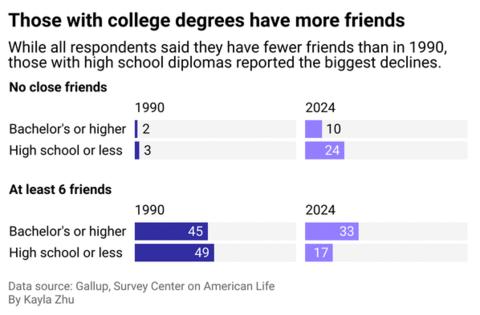In an age of social isolation, here's the surprising way education shapes friendships
Published in Slideshow World
Subscribe
In an age of social isolation, here's the surprising way education shapes friendships
Romantic love may come and go, but finding the Thelma to your Louise is forever.
Friends—besties, squads, workplace buddies, college roommates—play a unique role in our lives. They're companions and confidants; they share our stories and know us better than we know ourselves. Whether they show up in real life or drop the perfect response in the group chat, having a friend who just gets it is priceless.
Still, in a nation grappling with social isolation and a loneliness public health crisis, a troubling pattern has emerged: Americans without a college degree are significantly more likely to report having no close friends than those with a college degree. According to the Survey Center on American Life's 2024 American Social Capital Survey, nearly 1 in 4 Americans with a high school education or less reported having no close friends, compared to just 1 in 10 college graduates. This gap represents a significant shift from 1990, when these figures stood at just 2% and 3%, respectively. Overall, 17% of Americans now report having no close friends at all, and 23% say they have no close friends living nearby.
Among Black Americans, the educational divide in friendship is even starker: Roughly 1 in 3 (35%) Black Americans with a high school education or less report having no close friends, compared to 11% of Black college graduates.
Spokeo used Survey Center on American Life survey data to examine how friendships and networks differ between college-educated Americans and those without a four-year college degree.
Visit thestacker.com for similar lists and stories.
How higher education builds social networks
A four-year college degree is much more than a "piece of paper," according to Daniel Cox, director of the Survey Center on American Life. The college experience provides a rich social environment for fostering important lifelong friendships.
"It's an incredibly important social experience," Cox told Stacker. "You learn how to socialize. You are put in a variety of different settings. You're allowed to connect with various different types of people."
Cox notes that despite demanding course loads, most college students have considerable free time for socializing. The structured college environment and on-campus living, in some cases, fosters long-term social benefits. Many college graduates point to their college years as the period when they formed their most important and formative relationships, Cox said.
College as a social launchpad
According to the American Social Capital Survey, college graduates are more likely to have at least six close friends, at 25% versus 17%. Roughly 1 in 3 Americans have three to four close friends, and 1 in 4 have six or more close friends.
College life also often includes participation in nonacademic activities like clubs, cultural activities, sports, and political organizations. These activities usually provide opportunities to develop social and emotional skills and build relationships and teamwork while navigating diverse social environments.
Meanwhile, distinct from the social benefits of college, Cox pointed to the decline in membership in labor unions and religious communities, two institutions that historically fostered social connections among Americans who did not pursue higher education. Union membership dropped to an all-time low of 7% in 2024, down from a peak of around 1 in 3 American workers in the 1950s.
"As people spent less time in these [unions and religious organizations] places, they were less involved in these communities, and their opportunities to build close and lasting relationships with people in their community deteriorated," Cox said.
Civic engagement and community ties by education level
Americans without a college degree have less social engagement overall. Nearly 4 in 5 (79%) of those with a high school diploma or less say they rarely or never volunteer in their community. Additionally, 3 in 4 seldom or never attend local events or community meetings, and about 2 in 3 (65%) rarely or never participate in social gatherings.
Meanwhile, Americans with higher education levels are more likely to participate in civic organizations; college graduates are nearly three times as likely to join nonreligious community groups, according to the survey. Meanwhile, Americans without college degrees participate minimally, if at all, in civic life.
College graduates are also more likely to join hobby or activity groups than their counterparts (25% versus 9%), participate in neighborhood associations or community groups (24% versus 9%), and take part in sports leagues or workout groups (16% versus 5%).
How employment patterns affect friendship
The social advantages of a bachelor's degree extend beyond one's time in college. After graduation, the job stability and workplace dynamics that often come with a degree further enhance social opportunities, according to Cox.
"You're working more regular shifts at a 9-to-5 schedule. You're working often with teams," he said. "Even [post-COVID-19 pandemic], when a lot of us are working remotely, there's still an awful lot of time you spend working with other people, collaborating. … And so there's an important social component to the time people spend in the office."
For those without college degrees, their employment situation often involves gig work, or jobs with high turnover rates and irregular schedules, Cox noted. "You don't have the opportunities to form longer-lasting relationships," he said. "There may not be opportunities to socialize after work or even at work."
The social divide in work environments
Additionally, higher earnings and greater financial stability among college graduates often translate to more disposable income and free time.
College graduates tend to have higher earnings compared to those whose highest level of education is a high school diploma. And while connections form across economic lines, earnings differences can strain friendships, according to a 2024 Bread Financial study on financial incompatibility. One in 5 (21%) respondents have lost a friendship over money, and 1 in 4 (26%) felt financially incompatible with their friends, according to the study.
As Cox says, college-educated Americans often have the flexibility and disposable income to participate in activities like fitness classes, gyms, and sports clubs. Having the means to take a yoga class or join a gym can make finding pathways to community engagement easier. In contrast, those without a degree are likelier to work irregular shifts or gig jobs, making it harder to find the time or resources for these hobbies.
Community building in a changing social landscape
A 2024 Pew Research Center survey found that workers in the United States without college degrees most often fill roles for drivers, construction laborers, customer service representatives, health aides, and front-line supervisors of sales workers. These jobs may require sporadic schedules and emotionally or physically draining work at lower wages, making it more challenging to find time or energy for social activities.
As the Survey Center on American Life report concluded, "The ability to cultivate strong social support is a privilege reserved for the college-educated, rather than an ordinary feature of American life."
Cox noted that in previous generations, friendships naturally formed through daily routines—whether at work, religious institutions, or community organizations.
"People were members of different groups, walked around their neighborhoods, and regularly chatted with their neighbors," he said.
Still, as these built-in social structures fade, he added, Americans must be more intentional about building and fostering community. Cox pointed out that spaces that serve as community hubs can create spontaneous social interactions. For example, in Washington D.C., some libraries are connected to coffee shops, allowing patrons to spend more time in a single place when it serves multiple needs.
There's a sense of "serendipity" when people interact this haphazard way, Cox said, adding that "repeated interactions can be very effective [for] fostering trust and creating community."
Story editing by Alizah Salario. Copy editing by Paris Close. Photo selection by Ania Antecka.
This story originally appeared on Spokeo and was produced and distributed in partnership with Stacker Studio.









Comments